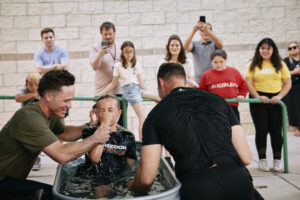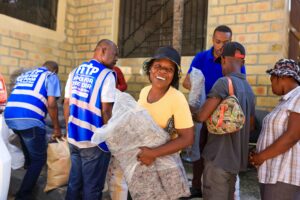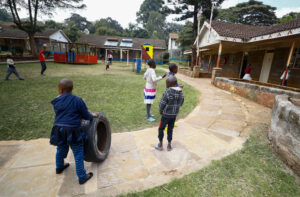Christians flee as violence spreads to northern Iraqi cities
MOSUL, Iraq (BP) -- Iraqi Christians came under fire again as the bloody campaign of Islamic militants spilled over from Syria into Iraq's northern cities last week. [QUOTE@right@180="All the faithful have left [Mosul]. Who knows whether they will ever be able to return."
-- Archbishop Emil Shimoun Nona]An estimated 10,000 fighters from the Islamic State of Iraq and al-Sham (the Levant), also known as ISIS and ISIL, advanced rapidly on Mosul and other northern Iraqi cities, such as Tikrit and Kirkuk, leaving a wave of destruction in their path and sending the Iraqi army reeling in panic. By June 15, ISIS terrorists had begun to approach Baghdad. Iraqi soldiers, policemen and government officials captured by ISIS have been summarily executed, as have some Chaldean Catholics, according to reports from sources inside the besieged region. Those same sources claim nearly all of the remaining Catholics have fled Mosul. "All the faithful have left the city," Archbishop Emil Shimoun Nona told the Catholic World Report. "Who knows whether they will ever be able to return." Since the United States invaded Iraq in 2003 to overthrow Saddam Hussein, nearly 1 million Christians have left the country. An estimated 500,000 remained in the northern portion of the country among the Chaldean Catholic community, which has existed there for 2,000 years. Nona said there were "35,000 faithful living in Mosul" in 2003. "Three thousand were still there in early 2014," Nona said. "Now, probably no one is left there and that is tragic." Haitham Jazrawi, pastor of Kirkuk Evangelical Church, confirmed the report. "Ninety nine percent of the Christians have left Mosul," Jazrawi told World Magazine June 10. The region's Catholics have been under pressure for some time, according to Catholic News Service. The agency quoted an Iraqi Catholic identifying himself only as "Danny," who said Christians "have been the objects of kidnapping, torture and killing by extremists, hoping to extort money from us or to force us to convert to Islam, for several months." Father Khalil Jaar, who is responsible for aiding Christian refugees who have reached Amman, Jordan, told Catholic News Service that ISIS forces have killed many Christians, but also Muslims who oppose their efforts to impose strict Sharia law. "All the people are suffering. But as we are a minority -- minority Christians -- it is normal to suffer more than others. But even the Muslims are suffering from these fanatic people," Jaar told CNS. "They don't have mercy on anyone, Christian or Muslim. The only answer they have is to kill them." According to the newspaper La Stampa, whose Vatican Insider project reports daily on Catholics around the world, at least one church under construction in Mosul has been demolished and the fourth-century monastery of Mar Benham is in the hands of ISIS militants. Vatican sources published the e-mail correspondence of a Dominican friar in the area, who told his superior the situation was "critical and apocalyptic." "They murdered adults and children. Hundreds of bodies have been left in the streets and in the homes, without any mercy," the Dominican friar wrote in his e-mail. If not killed for their faith, Christians who remain in occupied Mosul will likely see the imposition of a "dhimma" by ISIS if the group holds onto the city, just as Syrian Christians experienced when the Islamists took control of the ancient Christian city of Raqqa in March. Under a dhimma, a protection agreement much like those between mafia families and businesses, Islamists agree to offer "protection" to religious minorities in exchange for money. If the agreement is not signed, subjects are faced with the choice of converting to Islam or facing the sword. The Israeli newspaper Haaretz reported in March that Christians in Raqqa, Syria, had signed the agreement, which committed them to a biannual tax of "four gold dinars" -- about $500 per person. In addition to being required to practice Christianity behind closed doors, Christians in Raqqa were told to follow 11 other directives in order to keep the agreement with their Muslim overlords. Among those directives, Christians were prohibited from building new sanctuaries or restoring ones damaged in the civil war there, and they were forbidden from aiding any faction or government opposed to ISIS, Haaretz reported. The U.S. State Department condemned the agreement in Raqqa as a violation of "universal human rights." Nina Shea, writing in National Review Online, said the situation in northern Iraq shows "the religious cleansing of Christians from Iraq is entering the end game." "President Maliki is vowing that Iraq's army will regain control, but this may take time. ISIS has controlled parts of Ramadi, the capital of Sunni Muslim Anbar province, and much of Fallujah for the past six months. When the army does eventually succeed in reversing jihadi control in Mosul, it may be too late for the Christians. Once Middle Eastern Christians flee to the West, they don't return," Shea wrote. "This is a profound development for the Christian church, of course, which has had a two-thousand-year-old presence there. But it will have long-term national-security implications for the West. American political leaders have so far failed to distinguish the religious cleansing from its surrounding context of terror and conflict. They overlook the fact that religious pluralism and diversity are among today's casualties." ISIS disavows any notion of freedom of religion. The group, which began as Al-Qaeda in Iraq, has morphed into a sect deemed too violent even by Al-Qaeda's spiritual leader, Ayman al-Zawahiri, who was second in command to Osama bin Laden. Zawahiri has supported a group in Syria called Al-Nusra, which -- though it has committed atrocities of its own -- has been more protective of civilians.
Westboro protester Fred Phelps dies at 84
NASHVILLE (BP) –- Fred Phelps, the controversial pastor of the independent Westboro Baptist Church in Topeka, Kan., known for its protests of homosexuals and presidents as well as military funerals and the Southern Baptist Convention, died March 19. He was 84.
Presbyterian mega church leaves denomination
NASVHILLE (BP) -- The 4,000-member Menlo Park Presbyterian Church has decided to sever ties with Presbyterian Church (USA) over differences in doctrine and evangelistic philosophy.
Islamic militants threaten Syrian Christians
WASHINGTON (BP) -- The U.S. State Department has issued a statement deploring what it calls "continued threats against Christians and other minorities in Syria" from militant Islamists at war with both Syrian President Bashar al-Assad and fellow Islamic militants.
‘Rise of erotic liberty’ signaled in Arizona veto
NASHVILLE (BP) -- Arizona Gov. Jan Brewer's veto of legislation that would have protected the religious freedom of that state's citizens signals "something entirely new in human history" -- "the rise of erotic liberty at the expense of religious liberty," according to R. Albert Mohler Jr.
Marijuana legalization: Well-funded advocates soften voters; governments eye tax dollars
NASHVILLE (BP) -- Hundreds of marijuana smokers lined up outside new state-sanctioned "pot dispensaries" in Colorado Jan. 1, the first day citizens, as well as tourists, could legally buy the drug for recreational use.
Obama, the Olympics, homosexuality & Saeed
NASHVILLE (BP) -- Two openly homosexual athletes have been named to the U.S. delegation for the opening and closing ceremonies of the Winter Olympics in Sochi, Russia, the White House said in a statement Dec. 17.
Workplace religious rights set forth in ADF legal analysis
NASHVILLE (BP) -- As the diversity of religious expression in the United States has grown, the number of complaints of religious discrimination in the workplace has grown as well.
Pornography on mobile devices fueling addiction, brokenness
NASHVILLE (BP) -- By 2017, access to pornography on smartphones and tablets will be available to 250 million people worldwide, according to a new study from Juniper Research, a London-area analyst of the wireless sector.
Baptist chaplaincy rules called consistent with military policy
NASHVILLE (BP) -- New guidelines from the North American Mission Board prohibiting Southern Baptist military chaplains from officiating same-sex marriage ceremonies and counseling same-sex couples reflect the Southern Baptist Convention's most basic understanding of separation of church and state, Russell D. Moore, president of the SBC Ethics and Religious Liberty Commission, said in an online video dialogue Sept. 19. Moore's dialogue with Andrew Walker, the ERLC's director of policy studies, came after several former military chaplains and a group of atheists criticized the new guidelines. Some said SBC chaplains should resign because they would be unable to fulfill their duties among all service members. Moore, however, noted, "We have liberal Baptist groups who for many, many years have talked about religious liberty and separation of church and state now saying we need an established religion that says the sexual revolution is now codified and the government ought to enforce it. "What essentially is happening is we're calling for the separation of church and state, to be able to say chaplaincy isn't a subset of the military," Moore said in the dialogue posted at the ERLC website. "Instead, what the military is doing -- having chaplains -- is to enable people in the military to freely exercise their religion. It is not just a post of some kind of American civil religion. That is why we don't just have a vague, generic, least-common-denominator chaplain." It is also why Mormons, Buddhists, Catholics, Jews and Muslims have military chaplains, Moore said. In addition to prohibiting participation in same-sex marriage ceremonies and counseling same-sex couples, NAMB guidelines now include explicit statements that Southern Baptist chaplains will practice ministry in light of the biblical definition of marriage as "the uniting of one man and one woman in covenant commitment for a lifetime," as described in the SBC Baptist Faith and Message. The guidelines also state that Southern Baptists view all sexual immorality as sin that violates God's biblical standards for purity and that "responsible pastoral care will seek to offer repentance and forgiveness, help and healing, and restoration through the mercy and grace of Jesus Christ's sacrificial gift of love on the cross." Finally, Southern Baptist military chaplains are prohibited from participating in jointly-led worship services "with a chaplain, contractor or volunteer who personally practices a homosexual lifestyle or affirms a homosexual lifestyle or such conduct." NAMB guidelines acknowledge that Southern Baptist chaplains serve in a pluralistic setting but expect, under U.S. Department of Defense guidelines, that the rights and freedoms of chaplains will be protected so they may "preach, teach and counsel in accordance with the tenets of their denominational faith group and their own religious conscience" while treating all others with dignity, respect and Christ-like love. (For the Baptist Press story Aug. 30, "NAMB guidelines for military chaplains updated to address same-sex unions," click here.) Walker said in the video dialog that NAMB found it necessary to offer a more precise statement of its chaplaincy guidelines in a "post-DOMA" world created by the Supreme Court's decision to overturn the federal Defense of Marriage Act in June. "We're very concerned about our chaplains offering a proper witness -- a Christ-like witness -- that respects all individuals in the military but also holds firm to Southern Baptist doctrine," Walker said. Walker also said there is "nothing condemning about the regulations." But not everyone agrees.











